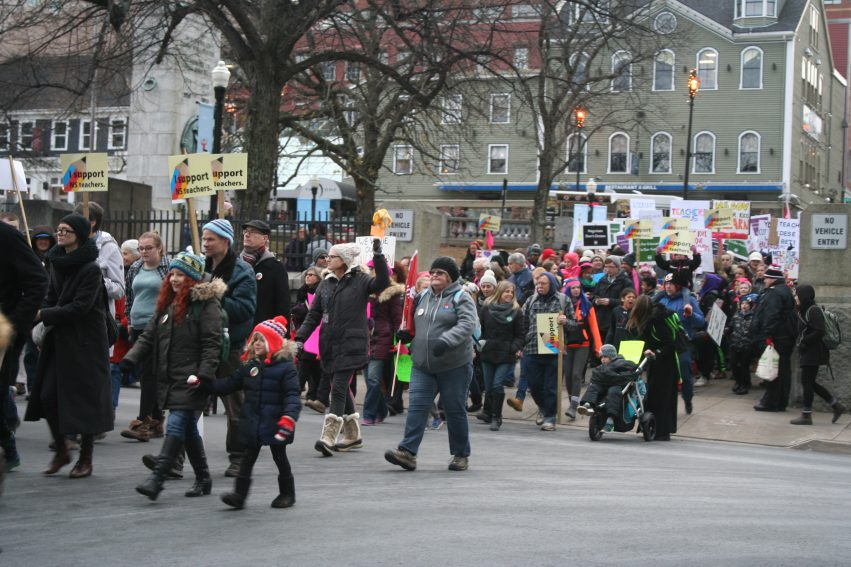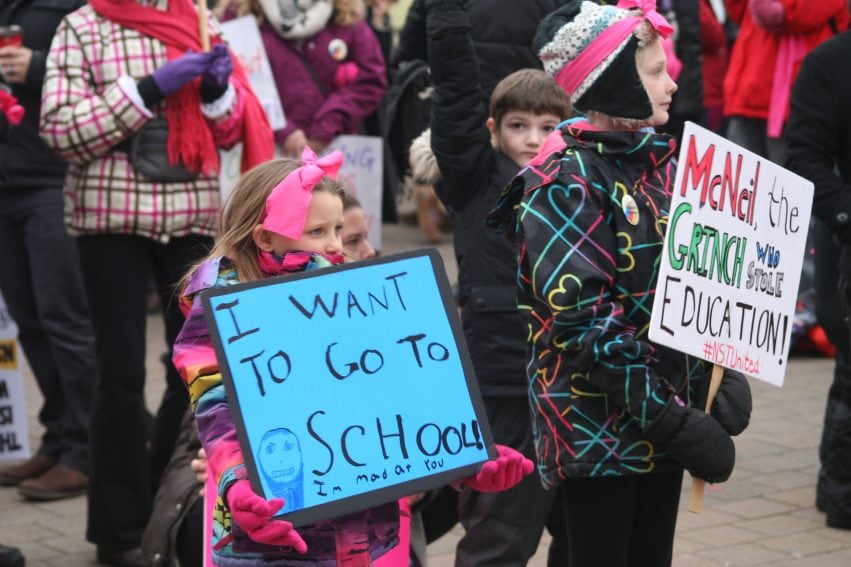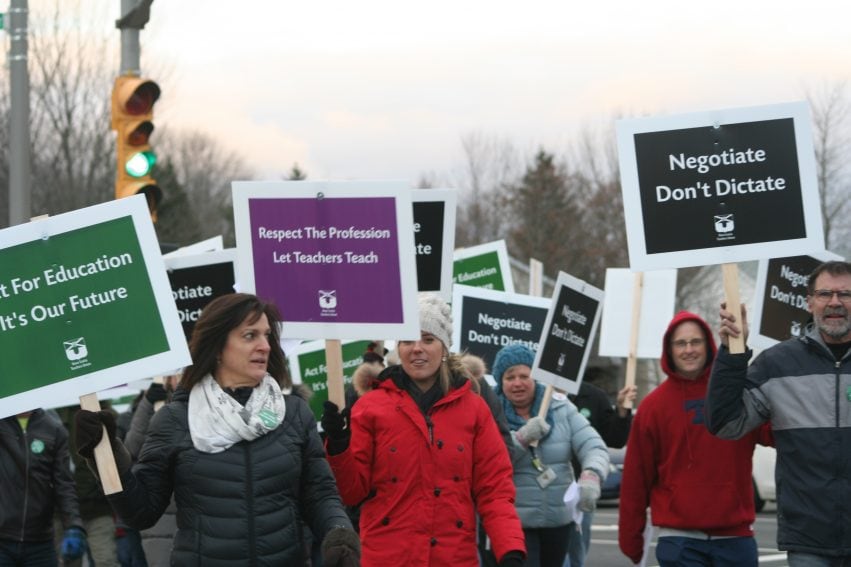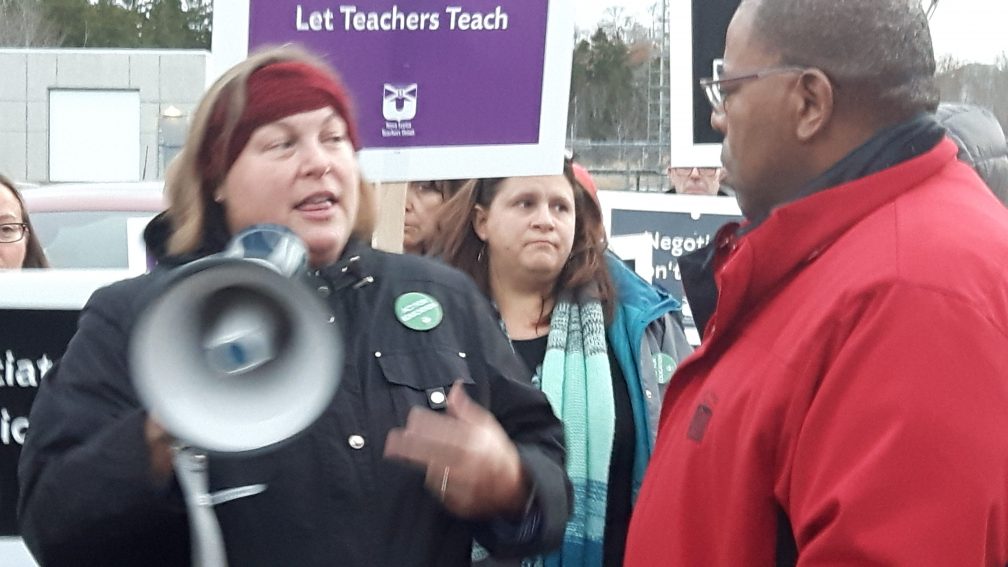KJIPUKTUK (Halifax) – From the very popular Nova Scotia Parents for Teachers Facebook page comes this FAQ about the what and why of the Nova Scotia Teachers Union work to rule action. From “Isn’t the government broke?” to “What about our Christmas Concert?“, it’s all here. We added a table of content for easy navigation.
What is this group for?
Aren’t the teachers professionals?
If they’re professionals, why do they need a union?
Can governments take away the right to strike?
If the law is clear, then why is the Nova Scotia government not obeying it?
If the courts have time and again protected the right to strike or arbitration at considerable expense to provinces, why does the Nova Scotia government believe it’s so special?
Can we afford public sector workers?
But the government claims it simply doesn’t have the money. Is that correct?
What is the government offering to teachers and what is the teachers’ response?
What is the difference between a work-to-rule and a strike?
Why were Christmas concerts cancelled?
Why can’t the parties discuss teachers’ working conditions at a separate table?
Will my kid’s educational future suffer due to the industrial action taken by teachers?
Why can’t the public find out more from both the union and the government about what’s happening in negotiations?
Stephen McNeil and Justin Trudeau are both leaders of the Liberal Party governments. Why are they so different in their political and fiscal viewpoints? Can Trudeau put pressure on McNeil?
What happened with the introduction of back-to-work legislation on December 5?
So what should we as students, parents and citizens do?

What is this group for?
This group is called “Nova Scotia Parents for Teachers.” As the name implies, the group was set up as a forum for those who take the side of the teachers in this labour dispute.
Our purpose is to support the teachers and encourage them in this very difficult time and circumstance. We feel that Nova Scotians need to fight back against this government’s vindictive austerity agenda and right now the teachers are leading the way.
We don’t mind comments and questions that are critical of the teachers and/or their union, but if you support the government’s side or say “a pox on both your houses” then perhaps this group is not for you.
Aren’t the teachers professionals?
According to most reliable definitions of the word, our public school teachers are professionals.
If they’re professionals, why do they need a union?
Some professionals, like lawyers and doctors are self-employed. But many others, like nurses and teachers, are mostly employed.
Unfortunately for employees, professional status is a weak guarantee of fair treatment by their employer. In fact, professionals often allow themselves to be exploited and hesitate to fight back out of a sense of professional duty. We know that teachers, for example, often spend their own money to buy school supplies for students. And, as the work-to-rule shows, under normal conditions, they perform all sorts of valuable services that are not strictly in their job description.
Most employed professionals in Canada also belong to unions as the collective bargaining regime affords them greater legal or organizational clout.
Without legal union and collective bargaining status, employees can engage in discussions with their employer, but the employer is under no obligation to participate in or continue with these discussions. And the employees have no legal alternatives if the employer doesn’t cooperate.
Can governments take away the right to strike?
Recognizing the circumstances described above, in the past decade, the Supreme Court of Canada has made several landmark rulings about labour relations, including the right to strike
As Supreme Court of Canada Justice Rosalie Abella wrote in the January 2015 decision on the right to strike:
“The right to strike is essential to realizing these values [dignity, equality, liberty, respect for the autonomy of the person and the enhancement of democracy] through a collective bargaining process because it permits workers to withdraw their labour in concert when collective bargaining reaches an impasse. Through a strike, workers come together to participate directly in the process of determining their wages, working conditions and the rules that will govern their working lives. The ability to strike thereby allows workers, through collective action, to refuse to work under imposed terms and conditions. This collective action at the moment of impasse is an affirmation of the dignity and autonomy of employees in their working lives.”
Under the Supreme Court rulings, governments CAN take away the right to strike BUT in a way that minimally intrudes upon the process of real collective bargaining. Governments cannot act unilaterally to impose conditions upon public service workers or exclude certain subjects from bargaining. Moreover, if the strike weapon is removed, it must be replaced with a method that comes as close as possible to achieving a result commensurate with collective bargaining. And that means independent, unfettered, unimpaired third-party binding arbitration. Arbitrators must be able to fashion their own decisions without any interference from governments.
If the law is clear, then why is the Nova Scotia government not obeying it?
The problem is that governments across Canada (and, of course, the Liberal Nova Scotia government) do not want to negotiate on many issues AND they do not want strikes by public service workers AND they do not want arbitration. So, they will do everything they can to avoid these obligations.
In the past few years, the courts have struck down several laws and practices of provincial governments. Regarding British Columbia, for example, the Supreme Court of Canada ruled that class size and composition are subject to negotiation. The BC government will need to pay hundreds of millions in amends, loading BC taxpayers with a whopping bill for its indiscretions.
If the courts have time and again protected the right to strike or arbitration at considerable expense to provinces, why does the Nova Scotia government believe it’s so special?
Here are two possible reasons
- Though their actions and laws will probably be overturned by the courts, they are binding until they are overturned, but not for at least five years. For the government, it kicks the ball down the road, imposing big costs later.
- Governments have a way of convincing themselves (and some of their followers) that THEIR actions and laws in restricting collective bargaining are different than all the others, that somehow technically those actions and laws distinguish themselves from all of the other cases across the country. This is seldom, if ever, true.
Can we afford public sector workers?
Public services like health care and education are delivered by large numbers of highly trained and dedicated professionals. If these professionals are not treated with respect, there is trouble. They might choose to work elsewhere. They might go on strike, even against the law, as in British Columbia. Or, as was the case with Nova Scotia nurses in a 2001 health care dispute, they may be so broken-hearted that they threaten to resign en masse.
Government arguments about “ability to pay” really don’t hold much water. If you hire a plumber, you must pay the going rate. Teachers also have a “going rate.”
But the government claims it simply doesn’t have the money. Is that correct?
Industrialized economies of the West have been getting wealthier and wealthier over the past 30 years. Even Nova Scotia has become about 70% richer over that time period (measured in Gross Domestic Product per capita.) We should be able to afford 70% more health care, education, social assistance etc. than 30 years ago.
Yet governments make it their business to convince their populations that we are poorer. The Nova Scotia government wants to balance the budget (eliminate the provincial deficit) within its first term so it can look “responsible.” But that argument is wearing thin with the voters.
Despite Nova Scotia being 70% richer on the whole, median wages here have actually declined over the 30 years. The extra wealth has gone almost entirely to the owners of capital – businesses and investors. And the government has been helping that along by weakening employment and labour law and cutting the pay of public workers.
The only groups that have barely held their own vis a vis inflation are those with credentials and mobility; they are also strongly unionized. That’s who the government is going after now. And the teachers are at the sharp end of the stick.
The government also says that Nova Scotia has a spending problem. Not so. Actually, per capita Nova Scotia spends less than nearly all other provinces on programs and services.
According to most economists, Nova Scotia’s debt-to-gdp ratio, at 38% (and it has been falling over the past 10 years) is ultra-manageable.
Indeed, there is no reason for any of the debt-and-deficit hysteria the government has been spreading.
Moreover, Canadians (and Nova Scotia voters especially) just a year ago enthusiastically elected a federal Liberal government promising increased deficit spending to boost the Canadian economy, put people back to work and restore our failing infrastructure.
The take-away is this: We, as citizens, in a liberal democracy, afford what we want to afford.
What is the government offering to teachers and what is the teachers’ response?
For several years now, teachers work has become harder. Class size and class composition have made teaching more onerous. Teachers now spend more and more of their time accounting for teaching and less and less teaching.
Adding insult to injury, the government is proposing a large pay cut, offering the following in a four-year deal:
- 0% in the first year
- 0% in the second year
- 1% in the third year
- 1.5% at the beginning of the fourth year
- A further 0.5% at the end of the fourth year
In recent years, inflation in Nova Scotia has been running at around 1.5%. If that continued through the four years, the government’s offer would amount to a 4.36% CUT in teachers’ real pay (accounting for inflation.)
According to “Canada’s Food Price Report 2017” issued recently by Dalhousie University, rising food prices in 2017 could even mean inflation several percentage points higher.
In addition, the government is proposing to freeze the “long service award” for teachers already employed and eliminating it entirely for new hires. The long-service payment is not a frivolous perk. It was negotiated in lieu of a pay raise and is thus deferred wages, and has saved the taxpayers millions over the years. The impact of losing it could cost some teachers as much as an additional 2% per year.
Provincial Finance Minister Randy Delorey’s recent December fiscal update says, in effect, if the unions would only be reasonable and agree to a pay cut, his government could boast a razor-thin surplus next year, to take into a provincial election. That’s what this all about. But the province’s long-term economic health will not be built through pay cuts.
In response, the Teachers Union is proposing to limit the amount of non-teaching work they have to do, keep pay proportionate with the cost-of-living and keep the long-service award. When you think about it, these are exceedingly modest demands.
What is the difference between a work-to-rule and a strike?
When a collective agreement has expired and unionized workers have bargained with their employer to an impasse, they are legally entitled to strike to put pressure on that employer.
A strike is any refusal to engage in “business as usual” i.e. refusal to perform the full range of duties required by the employer.
A strike can range on a continuum from fairly light sanctions to a full-scale walkout by the employees. A work-to-rule is one of the way-stations.
In the public sector, like hospitals, schools and government services, strikes and lockouts, of necessity, inconvenience members of the public who use these institutions.
In public education, the inconvenience to children’s education is complicated by the fact that younger schoolchildren cannot be left without supervision. If those children are not in school, then their parents must find suitable child care or do their own supervision, often staying home from work to do so. Knowing this, the Teachers Union is taking a fairly light job action.
Why were Christmas concerts cancelled?
The Teachers Union is working to rule as of December 5. Teachers are still working but under the following restrictions:
- They will arrive 20 minutes before school and leave 20 minutes after, as per the requirements of their contract..
- They will not perform clerical duties or data-entry tasks. They will monitor student attendance on paper.
- They will not participate in extracurricular activities such as concerts, team coaching and clubs.
- They will not participate in field trips.
Some parents and children have expressed dismay at the cancellation of Christmas concerts. And teachers are not happy about it either. But we must remember that there can be no strike or partial strike without some sting. If we support our teachers, we have to accept that reality. Moreover, the temporary withdrawal of teachers’ extra-curricular activities helps us appreciate exactly how valuable those “extras” are, and how much of their own volunteer time teachers contribute toward them.
Why can’t the parties discuss teachers’ working conditions at a separate table?
Teachers have been raising issues related to their working conditions through existing mechanisms such as management-teacher committees for years, with very little meaningful improvement. Part of the teachers’ “no” votes to 2 tentative agreements in the past year were based on the fact that they need binding commitments from government for these conditions to improve.
Governments want to keep as many issues (other than money) “off the table” even though the Supreme Court of Canada has ruled that these issues can be part of collective bargaining. If the teachers are going to improve their working conditions and our kids’ learning conditions, then these issues must be “on the table.”
Will my kid’s educational future suffer due to the industrial action taken by teachers?
Public school teachers have been on strike several times in several provinces over the years and, to our knowledge, none of these strikes prevented grade 12s from advancing in their education. As another example, there have been many strikes by university faculty over the years and again we are not aware of any that permanently impaired students educational and life careers.
Why can’t the public find out more from both the union and the government about what’s happening in negotiations?
Some people ask why negotiations between the government and the union are so secretive. All labour negotiations are like that. The negotiating committees for the two parties come to the table with different positions and the best results are achieved if the parties feel free to say what they want barter, swap, trade, argue, cajole, and bicker. The end result of this bargaining is always taken back to the union members for their vote. If the parties reach an impasse and the help of a conciliator or mediator is available, the job of that third party is made easier under a veil of temporary silence.
At least that’s what is supposed to happen during ordinary negotiations. But in these negotiations, the government has adopted a “take it or leave it” attitude from the start.
Stephen McNeil and Justin Trudeau are both leaders of the Liberal Party governments. Why are they so different in their political and fiscal viewpoints? Can Trudeau put pressure on McNeil?
Two years after McNeil was elected promising austerity, the tenor of provincial politics has changed. Nova Scotia voters, fed up with the right-wing policies of the Harper Conservatives, elected Trudeau Liberals in every federal riding in the province. The Trudeau government is committed to a different agenda.
Can Justin Trudeau put pressure on McNeil to change his approach? Not really. In issues like the provincial economy and labour relations, the provinces have almost sovereign power. And the Liberal Party is what they call “a broad church” with several distinct political tendencies, from right to left. That’s part of what makes it such a successful political brand. So let’s not hold our breath about Trudeau leaning on McNeil. The Liberal pushback will have to come from within the Nova Scotia party.
What happened with the introduction of back-to-work legislation on December 5?
We don’t know for sure, but here’s what we’ve been able to piece together.
A year ago, it seemed to the government that teachers (who had never struck in their history) would be a pushover in the path to implementing its fiscal package. With the teachers’ agreement tucked away, the government hoped, it could then isolate the other unions.
The government must have been as surprised as anyone when the teachers rejected the settlement not once, but twice, and by an increasing majority, and then voted for a strike by 96%.
The emergence of Students for Teachers and our own group, Nova Scotia Parents for Teachers and several massive rallies showed just how strongly the public supported teachers and opposed government bullying. Hundreds, if not thousands, of people contacted their MLAs to say so.
Given the direction of the Supreme Court of Canada, the government was losing its moral authority on this issue and several Liberal MLAs were becoming uncomfortable with the government’s position and likely made their feelings known in caucus.
Things came to a head when the Teachers Union announced its work-to -rule and the government decided to introduce legislation imposing a collective agreement on the teachers, effectively banning the strike. Several Liberal MLAs likely indicated they would vote against the law. The legislation might still have passed, but the government would have been in deep trouble, especially with a provincial election in the offing.
The government’s excuse for introducing the legislation was that the teachers’ work-to-rule would put students in danger. This was so transparently ridiculous that nobody was buying it. And the government didn’t do itself any favours when it withdrew the legislation claiming that all of a sudden, the Teachers Union had made assurances of student safety. Even worse, the government decided to lock students out on December 5 while forcing teachers to sit in empty schools.
Recent polling by Angus Reid shows that “it is Nova Scotia Premier Stephen McNeil who experiences the largest drop in job approval over the past three months: from 38 to 31 per cent. Much of this is attributable to an ongoing labour dispute with teachers and a controversial decision by the government to close schools on Monday, Dec.5, after the Nova Scotia Teachers Union directed teachers and staff to operate under a work-to-rule protocol.” McNeil’s numbers have fallen from a high of 66% two years ago. McNeil also currently has a disapproval rating of 60%.
So what should we as students, parents and citizens do?
The teachers are being exceedingly modest in their resistance to the government’s agenda. They deserve our continuing support. Their battle is not just their own, but that of many Nova Scotians.
Remember that we have accomplished a great deal in a little more than a month. We are winning. The government is losing. We must maintain confidence and keep fighting.
Talk to your neighbours – on your street, on social media, in the media, in rallies, at meetings. Make your views known to your MLAs, especially those on the government side of the House. Keep up the struggle.
Check out the Facebook page of the Nova Scotia Parents for Teachers. It is comprised of parents and grandparents of students in the public school system and supports teachers in the current dispute between the Teachers Union and the provincial government.
In the unlikely event that you have a bit of money just sitting around, please support the Nova Scotia Advocate so that it can continue to cover issues such as poverty, racism, exclusion, workers’ rights and the environment in Nova Scotia.







If you broaden the concept of a labour organization to mean any group of workers who band together to act collectively for their own economic benefit, then doctors and lawyers are among the most powerfully unionized workers in the whole economy. If McNeil proposed to abolish their legislated monopoly, you’d see them in the streets as well.
Well done, Larry. The NSTU impasse has implications for all public-sector workers, including post-secondary educators. The lesson is stark: defend your collective-bargaining rights or risk losing them. Just look at the sorry situation in Wisconsin.